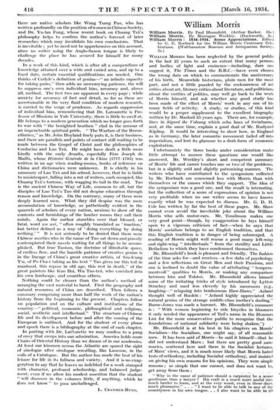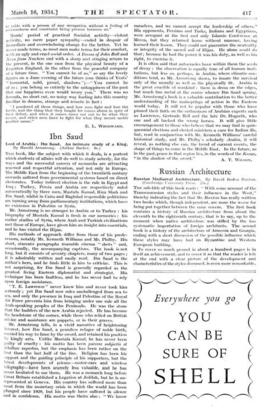William Morris
by G. E. Roebuck for the William Morris Centenary Cele. brations. (Walthamstow Museum and Antiquarian Society.
2s.)
WILLIAM MORRIS has been neglected by the general public in the last 25 years to such an extent that many persons and bodies of light and eminence—including, dare one suggest it, The Times and the B.B.C.—have even chosen the wrong date on which to commemorate the anniversary of his birth. Meanwhile historians, plain men for the most part, and not a little puzzled by the cocksureness of art critics about art, literary critics about literature, and politicians about the verities of politics, may well go back to the work
of Morris himself, and ask whether any good study has been made of the effect of Morris' work in any one of his
many fields of activity. A study, or studies, of this kind would be a proper supplement to the excellent biography written by Dr. Mackail 35 years-ago. There are, for example, lines in Sigurd the Volsung which echo lines of Swinburne, and, at the same time, explain a good deal of Mr. Rudyard Kipling. It would be interesting to show how, in England
as in Germany, the later romantic movement tailed off into imperialism, and lent its glamour to a drab form of economic exploitation.
Unfortunately the three books under consideration make little attempt to answer these questions one would like answered. Mr. Weekley's short and competent summary of Morris' life and career touches one or two of the problems, but in a slightly arid and slightly patronizing manner. The writers who have contributed to the symposium collected by Mr. Roebuck are concerned less with Morris than with themselves or the causes which they support. The idea of the symposium was a good one, and the result is interesting, but the collection of a score of expressions of opinion is not very profitable when no one writer seems to have known exactly what he was expected to discuss. Mr. G. D. H. Cole has written by far the best of these pages. Mr. Shaw cannot even avoid the inevitable joke about the William Morris who sells motor-cars. Mr. Tomlinson makes one very good point—though, by exaggeration he lays himself open to a vigorous criticism of fact—when he says that Morris' socialism belongs to an English tradition, and that this English tradition is in danger of being submerged. A reading of Morris might well rescue a good many left-wing and right-wing " intellectuals " from the sterility and Little Bethelism to which they have condemned themselves.
Mr. Bloomfield's book is pleasant and friendly. The fashion of the time asks for—and receives—a few dabs of psychology and a few reflections on Great Men and their Passions, and one is inclined to doubt the value of attributing " tempera- mentvoll " qualities to Morris, or making any comparison between him and Tolstoi. Mr. Bloomfield allows himself some of the irritating tricks of style introduced by Lytton
Strachey and used less cleverly by his successors (e.g., laughing—" relapsing into bonhomous Haw-Haws." Acland
thought well of Ruskin : " Acland highly appreciated the natural genius of the strange middle-class mother's darling."
Burne-Jones was made a baronet. Mr. Bloomfield's -comment is : " With women beginning to ride bicycles in bloomers
it only needed the appearance of Ted's name in the Honours List for the more conservative public to recognize that the foundations of national solidarity were being shaken.") Mr. Bloomfield is at his best in his chapters on Morris' Socialism—the Socialism, one might say, of all reasonable men. It has been said of Morris—he said it himself—that he did not understand Marx ; but there are pretty good sum- maries, scattered here and there in the Socialist lectures, of Marx' views, and it is much more likely that Morris hated tests of orthodoxy, including Socialist orthodoxy, and insisted on giving his own reasons for his opinions. They were simple reasons ; so simple that one cannot, and does not want to, get away from them :
" Why in the name of patience should a carpenter be a worse gentleman than a lawyer Y Ilia craft is a much more useful hits, much harder to learn, and at the very worst, even in these. days. much pleasanter." . . .." I want to be able to talk to any of my Countrymen in his own tongue. , . I also want to be able to sit at table with a person of any occupation without a feeling of awkwardness and constraint being present between us."
Morris' period of practical Socialist .activity—violent activity, no mere paper sympathy—ended in .despair of immediate and overwhelming change for the better. Yet he never made terms, as most men make terms for their comfort,
with an ugly and cruel social order. A Dream of John Ball and zc cs from Nowhere end with a sharp and stinging return to the present, in the one case from the physical beauty of a forgotten England, in the other from the peaceful company of a future time. " You cannot be of us," so say the lovely figures on a June evening of the future (one thinks of Yeats' " Immortal, mild, proud, shadows ")—" You cannot be of us ; you belong so entirely to the unhappiness of the past that our happiness even would weary you." There was no formula, no short cut, no noisy way leading into this country familiar in dreams, strange and remote in fact : " I pondered all these things, and how men fight and lose the battle, and the thing that they fought for comes about in spite of their defeat, and when it comes turns out not to be what they meant, and other men have to fight for what they meant under another name."
E. L. WOODWARD.











































 Previous page
Previous page